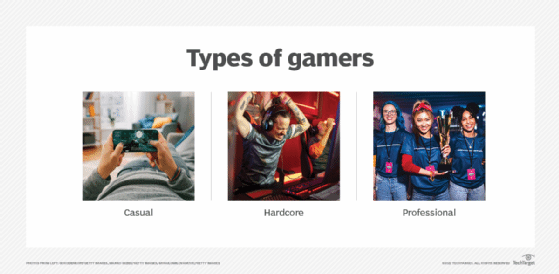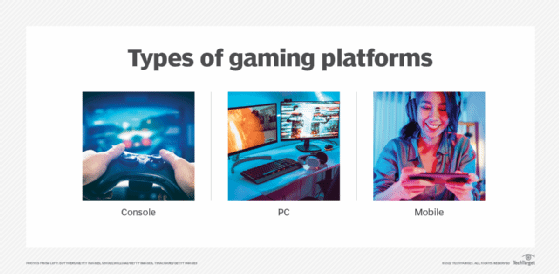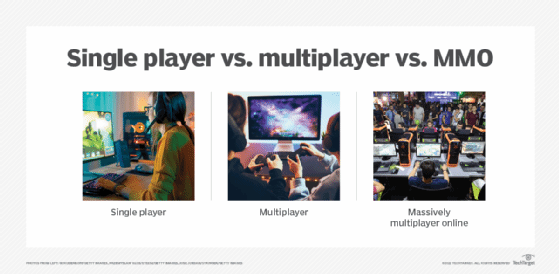role-playing game (RPG)
What is a role-playing game (RPG)?
A role-playing game (RPG) is a game in which each participant assumes the role of a character that can interact within the game's imaginary world. Many RPGs are set in fantasy or science fiction environments. Among the earliest and most popular RPGs are Dungeons and Dragons (D&D), BattleTech, and Star Wars Galaxies. Most RPGs are played online or digitally, making them part of the electronic game genre.
RPGs are often called video games. RPGs usually have a storyline and central quest players, or "gamers," aim to complete, adopting the role of a fictional character in the imaginary RPG world. Some RPGs also include additional side quests that may or may not be optional. These side quests let gamers gain more experience in the game and improve their character's attributes and abilities.
Most modern-day RPGs typically include one or more of these elements:
- Levels letting a player improve the character and earn more points as they progress.
- Statistics showing how many points a player has earned and their position vis-à-vis other players.
- A combat system that, among other elements, lets players choose their actions and abilities.
- Equipment, such as armor and weapons, that make players' characters stronger.
- Elements that let players interact with other players and with the gaming environment, such as traps, doors, etc.
- Character classes that each player can select, such as warrior, wizard, princess, etc.
Many RPGs include a participant known as the "game master" who usually acts as the game narrator and rule keeper. In electronic RPGs, unlike pen-and-paper RPGs, the role of a game master is automated. The game or the computer selects the actions of the game's non-player characters (NPCs) and enemies.
Popular RPGs
D&D remains one of the most popular RPGs of all time, with some reports suggesting that since its creation, over 50 million people have interacted with the game. Over time, many other RPGs have gained traction due to their rich character sets, compelling storylines, immersive story worlds, and memorable gaming experiences. Some popular RPGs include the following:
- EverQuest
- Wizardry 8
- Titan Quest
- Pillars of Eternity
- The Bard's Tale
- Betrayal at Krondor
- Monster Hunter: World
- Final Fantasy
- Assassin's Creed Valhalla
- Darkest Dungeon
- Dragon Age
History of RPGs
American game designers Ernest Gygax and David Arneson created D&D in 1974. The fantasy tabletop RPG is believed to be the precursor to modern-day online RPGs.
In D&D, set in a medieval fantasy world, each player creates a particular character and actively describes their actions and thoughts as they play. One player, the dungeon master (DM), assumes the storyteller role and leads the players through an adventure, creating a unique gaming experience for all participants. Players respond to the DM's story events in different ways. Players choose a race, a class, features, and skills for their characters. As the game progresses, players earn experience points to level up their characters and make them stronger.
Following the release of D&D, many more electronic RPGs appeared in the mid-70s. Some of these RPGs were multi-user dungeon RPGs (MUDs), such as Dungeon (not the same as D&D), Orthanc, and Oubliette. Most were built for playing on mainframes, typically found in universities rather than on home personal computers (PCs). They were either text-based or featured American Standard Code for Information Interchange (ASCII) standard text-mode graphics.
From the late 70s onwards, more RPGs emerged for home systems, such as Temple of Apshai and Beneath Apple Manor. In the 1980s, RPGs like Rogue (a "dungeon crawl" game), Diablo, and Nethack emerged. The rising popularity of home PCs led to the development of even more fantasy-based RPGs, many of which remained popular for many years. These include Wizardry, Final Fantasy, Dragon Quest and The Bard's Tale. At the time, most RPGs didn't have the disk space for text and relied on floppy disks. However, games that required more floppy disks were more expensive to produce and, therefore, more expensive to buy and play. Later games got around the problem either by providing printed books with instructions or through the development of other high-capacity storage media.
In the late 80s, Gold Box RPG games emerged; the name reflected the distinctive packaging design used for the games, which featured a golden-colored box. These games, such as Pool of Radiance and Death Knights of Krynn, frequently featured top-down worlds and menu-based combat situations. A top-down world refers to the visual perspective. The game's environment and characters are viewed from a bird's-eye view.
In a menu-based combat system, when it's a player's turn, they choose from a menu of options that may include actions such as attacking, using magic or skills, defending, using items, or retreating. The player selects an action for each character and those actions occur.
At this same time, tabletop and PC RPGs faced criticism on "moral" grounds for supposedly promoting Satanism. RPGs like Ultima tried to address this criticism by incorporating a positive main quest: to become a better person. Ultima's actions seem to have contributed to the growing popularity of RPGs over the next few decades.
From the late 80s on, RPGs emerged that offered gamers the chance to explore real-time three-dimensional (3D) worlds or participate in adventure gaming, a subgenre of RPGs that emphasizes exploration, discovery and puzzle-solving. Examples include Drakkhen and Hero's Quest. In later years, other adventure RPGs were released, such as Worlds of Ultima, The Savage Empire, and Worlds of Adventure 2: Martian Dreams.

Between the 1990s and the present era, new technological and computing innovations have enabled the development of highly complex and immersive RPGs. Most modern RPGs are heavily narrative-driven, feature "survival" situations, and include incredible character creation abilities and beautiful graphics. Many can be played either on PCs or on consoles, such as Microsoft Xbox, Sony PlayStation or Nintendo Switch.

Multi-user dungeon (MUD) RPGs
MUDs are fantasy or adventure-based RPGs that let multiple gamers play simultaneously. These RPGs are text-only games, like a chat room. To play a MUD, players connect with each other through a telnet client and take on the role of their characters in a virtual world. After logging into the client, players use simple typed commands to interact with each other and the RPG environment.
Each MUD has its own world that doesn't require graphical assets, only players' imaginations. A MUD doesn't require a player to act as the Gamemaster since its coded systems take on the role and bring the game's adventure to life.
In the past few decades, thousands of MUDs have sprung up and are hosted mainly by RPG enthusiasts rather than commercial companies. For this reason, most MUDs are free to play and available to anyone 24/7.
Massively multiplayer online role-playing games
The earliest RPGs were singleplayer games, meaning a single player played a character and was the only character in the game world. The player also controls the entire world through their choices and actions. Dragon Quest, Phantasy Star and Pokémon are among the most popular singleplayer RPGs.
Improvements in RPG graphics and internet speeds led to the emergence of graphical multiplayer RPGs, which eventually evolved into massive multiplayer online role-playing games (MMORPGs).

Like singleplayer RPGs, MMORPGs also have a story and a virtual reality game world. However, in MMORPGs, all players share the same world and game lore, so progress is determined by all players interacting with each other instead of just one player playing alone.
The earliest multiplayer RPGs limited the game world to a few players. Examples include Neverwinter Nights (1991) and Diablo (1997). In the late 90s, MMORPGs with more advanced graphics and larger game worlds were released, such as Ultima Online, EverQuest and Final Fantasy. Since the 2000s, other popular MMORPGs have emerged, such as World of Warcraft and Warhammer Online.
Most MMORPGs use a subscription model. Players must maintain a subscription to the game to get access to new areas that game creators add periodically. Many MMORPGs include non-player characters who aren't real people but can be part of a quest. In general, most players play with other players who are real people. Players can also join "guilds," chat with other players, go solo or engage in player vs. player activities.
Learn the differences between augmented reality vs. virtual reality vs. mixed reality.
